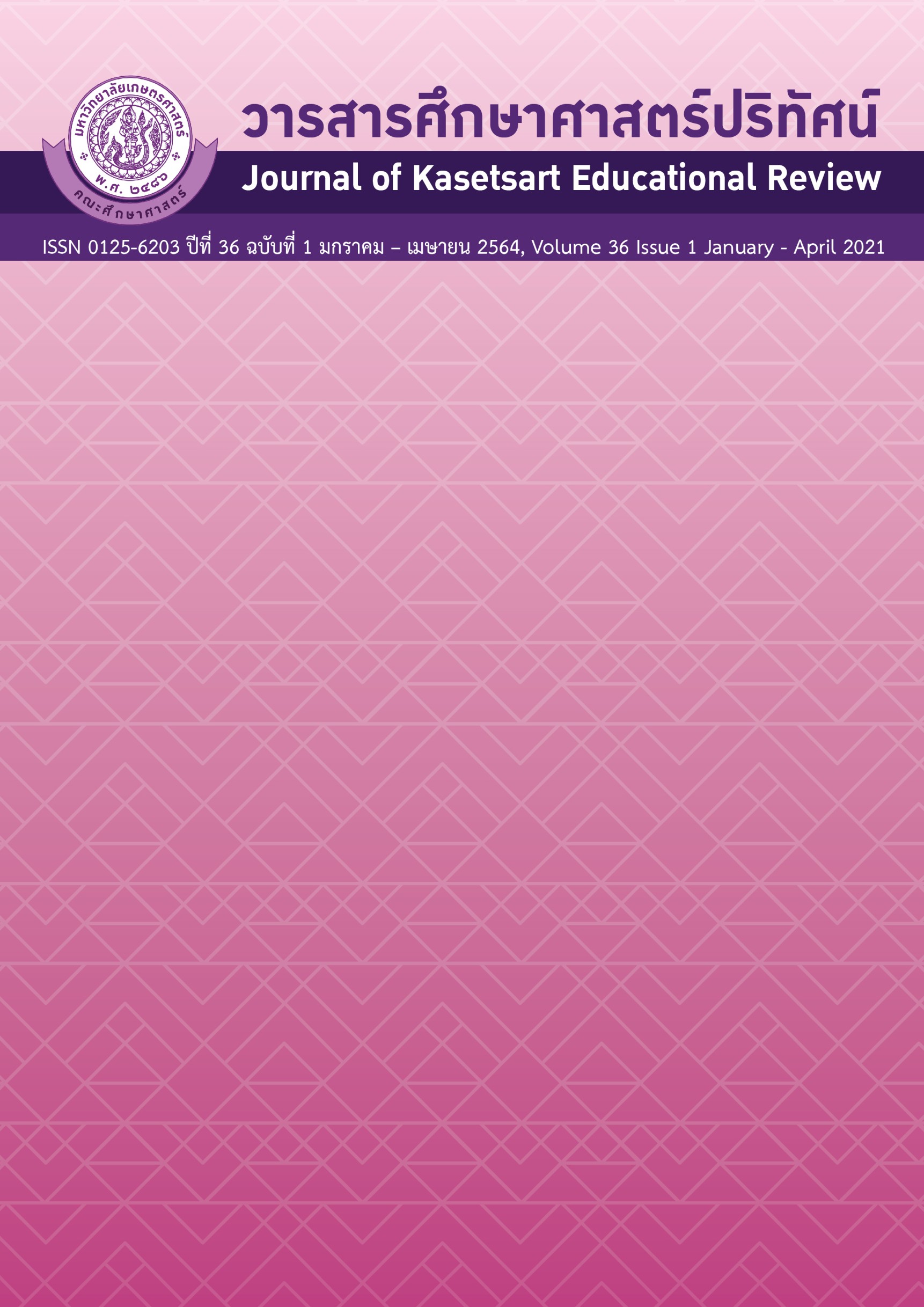การวิเคราะห์องค์ประกอบเชิงยืนยันภาวะผู้นำข้ามวัฒนธรรมของผู้บริหารโรงเรียนมัธยมศึกษา สังกัดสำนักงานเขตพื้นที่การศึกษามัธยมศึกษา เขต 25
คำสำคัญ:
การวิเคราะห์องค์ประกอบเชิงยืนยัน, ภาวะผู้นำข้ามวัฒนธรรม, โรงเรียนมัธยมศึกษาบทคัดย่อ
บทคัดย่อ
การวิจัยในครั้งนี้มีวัตถุประสงค์เพื่อ 1) เพื่อวิเคราะห์องประกอบภาวะผู้นำข้ามวัฒนธรรมของผู้บริหารโรงเรียนมัธยมศึกษา 2)เพื่อตรวจสอบความสอดคล้องกลมกลืนของโมเดลภาวะผู้นำข้ามวัฒนธรรมของผู้บริหารโรงเรียนมัธยมศึกษา กับข้อมูลเชิงประจักษ์ เป็นการวิจัยเชิงบรรยาย (Descriptive research) กลุ่มตัวอย่างที่ใช้ในการศึกษา ได้แก่ ผู้บริหารสถานศึกษาและครูในโรงเรียนมัธยมศึกษา สังกัดสำนักงานเขตพื้นที่การศึกษามัธยมศึกษาเขต 25 จำนวน 380 คน กำหนดกลุ่มตัวอย่างตามสัดส่วนต่อพารามิเตอร์ ใช้การสุ่มแบบหลายขั้นตอน (Multi-stage Sampling) เครื่องมือที่ใช้ในการเก็บข้อมูลคือ แบบสอบถามแบบมาตรประมาณค่า 5 ระดับ มีค่าIOC ตั้งแต่ 0.50-1.00 มีค่าความเชื่อมั่นเท่ากับ 0.981 วิเคราะห์ข้อมูลโดยใช้สถิติพรรณนาและสถิติอ้างอิงโดยโปรแกรม M-plus7 โดยมีผลการวิจัย ดังนี้
1) ผลการวิเคราะห์องค์ประกอบภาวะผู้นำข้ามวัฒนธรรมของผู้บริหารโรงเรียนมัธยมศึกษาประกอบด้วย 5 องค์ประกอบหลัก ได้แก่ 1) ความไว้วางใจ มี 3 ตัวบ่งชี้ 2) ความเห็นอกเห็นใจ มี 3 ตัวบ่งชี้ 3) การเปลี่ยนแปลงทางวัฒนธรรม มี 3 ตัวบ่งชี้ 4) อำนาจเชิงสร้างสรรค์ มี 2 ตัวบ่งชี้ และ5) การสื่อสารเชิงวัฒนธรรมมี 3 ตัวบ่งชี้
2) ผลการทดสอบความสอดคล้องกลมกลืนของโมเดลความสัมพันธ์โครงสร้างเชิงเส้นตัวบ่งชี้ภาวะผู้นำข้ามวัฒนธรรมของผู้บริหารโรงเรียนมัธยมศึกษา กับข้อมูลเชิงประจักษ์ โดยมีค่า = 68.077, df = 52, /df= 1.309, P=0.067, RMSEA =0.029, SRMR = 0.015, CFI = 0.998, และ TLI = 0.996
เอกสารอ้างอิง
Deng & Gibson. (2009). Mapping and modeling the capacities that underlie effective cross‐ cultural leadership: An interpretive study with practical outcomes. Cross Cultural Management: An International Journal. ISSN: 1352-7606. Publication date: 23 October
Grisham. (2006). Cross-cultural leadership. Article in International Journal of Managing Projects in Business. (online) 2006 (Cite 2019 Jun 29) Available from: https://www.researchgate.net/ publication/235304889_Crosscultural_leadership.
Hofstede, G. (2003). Culture’s Consequences: Comparing Values, Behaviors, Institutions, and Organizations across Nations. Behaviour Research and Therapy, 41, 861- 862.
Jose C.Alves.(2006). Across‐cultural perspective of self‐leadership. Journal mof Managerial Psychology,21(4),338-359. DOI:10.1108/02683940610663123.
Lacha Chuvijitra. (2018). The Factors affecting cross-cultural adjustment of international graduate students Faculty of Pharmacy Chulalongkorn University. Chulalongkorn University.
Mary Whitman. (2018). The Generation Gap – How to Bridge the Gap in the Workplace. (online)(Cite 2019 Oct 12) Available from: https://www.deputy.com/blog/the- generation-gap-how-to-bridge-the-gap-in- the-workplace.
Nattharat Thanathitikorn. (2012). Cross - culture leadership: Excellence leadership for professional school principals. Journal of education, Burapha university. Vol. 23 No. 2 (February-May 2012) Page 1-10.
Natthawut Nikornporn-udom. (2015). Work culture education Management style and work processes that affect Working life of employees of multinational companies in Bangkok. Bangkok University.
Nonglak Wiraschai. (2002). The development of learning quality process: Assessment and Insurance. Bangkok: VTC Communication.
Patcharaporn Jantharakod. (2018). Cultural Works, Managerial Patterns, and Working Processes affecting the quality of employees’ work life of the multinational companies in Bangkok. Light Isaan Journal Mahamakut Buddhist University Northeastern Campus.
Rathanan Pongviritthon. (2016). The Guidelines for the development of entrepreneurial leadership potential for organizational management Small and medium business balance model in the upper northern region of Thailand. FEU Academic Review: Vol 10 No 3 (2016): July- September 2016.
Siyathon Khun-on. (2016). The Cultural dimension and reviews of hotels in the area Ko Samui District via the website Online accommodation agent for Thai and other national customers.
TCDC. (2018). TREND2018: Generation Focus. TCDC Bankkok., December, 2018.United Nations Children's Fund Organization of Thailand. (2019). Education for the 21st century. The development skills are the heart of education. UNICEF Thailand.
ดาวน์โหลด
เผยแพร่แล้ว
ฉบับ
ประเภทบทความ
สัญญาอนุญาต
บทความทุกบทความเป็นลิขสิทธิ์ของวารสารคณะศึกษาศาสตร์ มหาวิทยาลัยเกษตรศาสตร์ วิทยาเขตบางเขน
วารสารศึกษาศาสตร์ปริทัศน์ (Kasetsart Educational Review)






